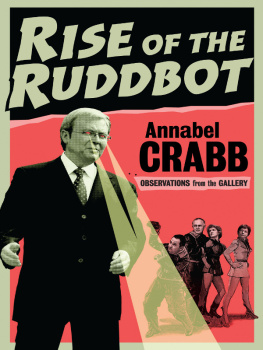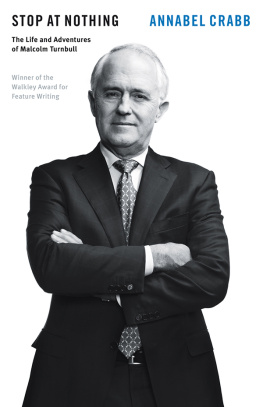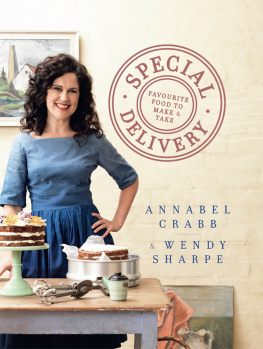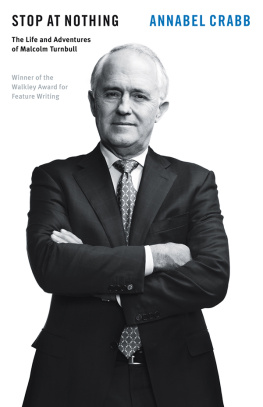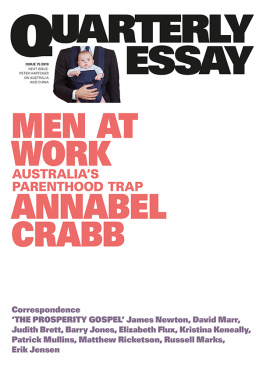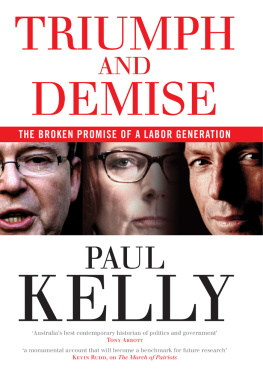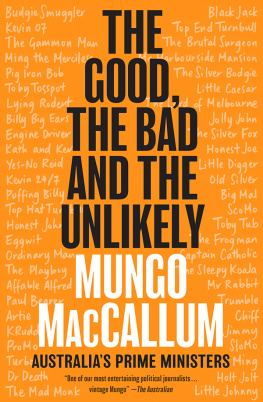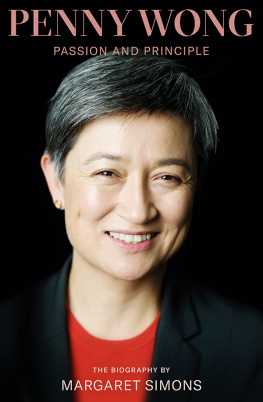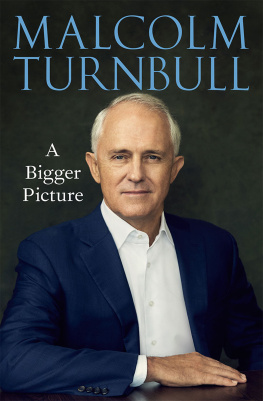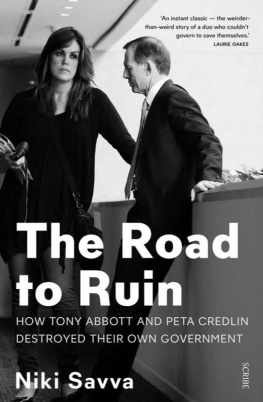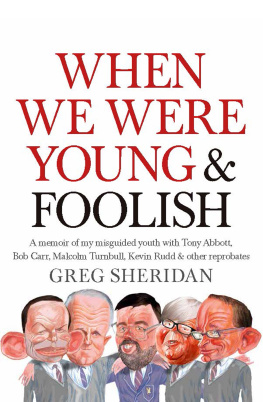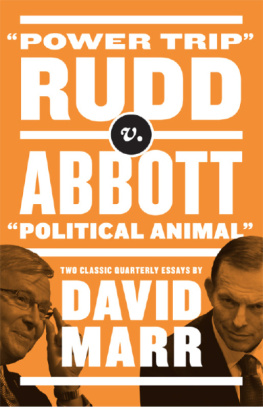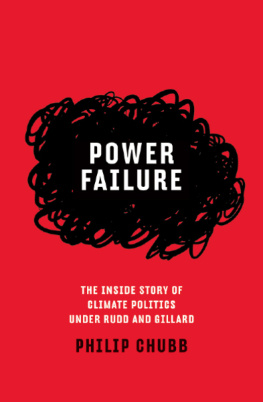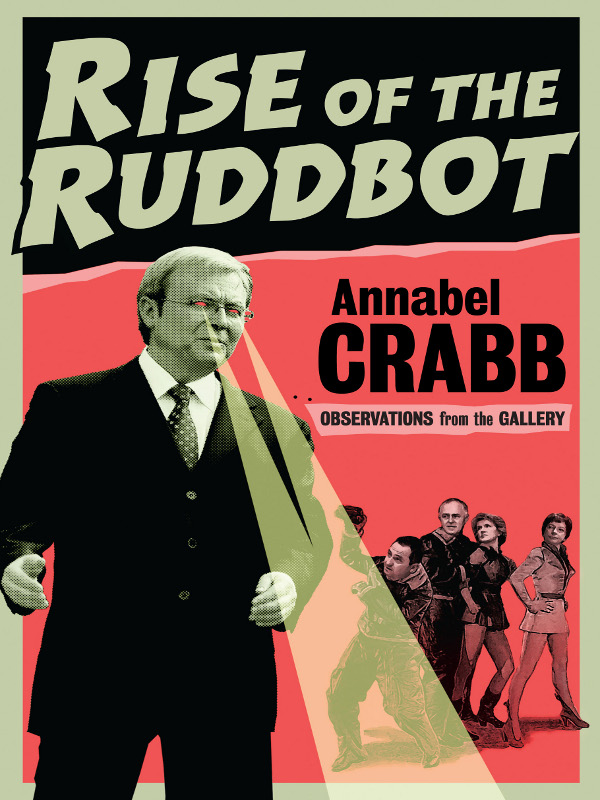
RISE OF THE RUDDBOT
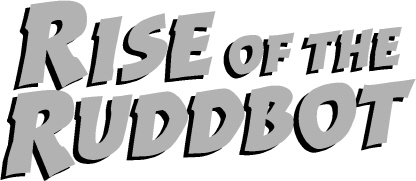
OBSERVATIONS from the GALLERY
Annabel CRABB

Published by Black Inc.,
an imprint of Schwartz Media Pty Ltd
Level 5, 289 Flinders Lane
Melbourne Victoria 3000 Australia
email: enquiries@blackincbooks.com
http://www.blackincbooks.com
Copyright 2010 AnnabeCrabb
ALL RIGHTS RESERVED.
No part of this publication may be reproduced, stored in a retrieval system, or transmitted in any form by any means electronic, mechanical, photocopying, recording or otherwise without the prior consent of the publishers.
National Library of Australia Cataloguing-in-Publication entry:
Crabb, Annabel.
Rise of the Ruddbot : observations from the gallery / Annabel Crabb.
ISBN: 9781863954839 (pbk.)
Political parties--Australia.
Politicians--Australia.
Australia--Politics and government--2001
324.29407
Book design by Thomas Deverall
Typeset by Duncan Blachford
Printed in Australia by Griffin Press
CONTENTS
Australians treat governments like university students treat bed linen. We usually wait a tiny bit too long to do it, and even then we do it only when the matter has become seriously unavoidable.
When, in 2007, the Australian electorate exchanged John Howard for Kevin Rudd, you could feel it coming. the antics of the longstanding Howard government took on a horrible garishness. I dont know about you, but for my money the Sydney APEC conference in September 2007 where by day Kevin Rudd spouted Mandarin uncontrollably and George W. Bush thanked Austria for having him, and by night the Howard cabinet ministers gathered to smoke cigars and come up withcack-handed plans to assassinate their leader was the richest example of this idiocy-in-decline.
People started to heckle the prime minister in the street. Previously, John Howards morning walk had been an event of some dignity a sign of a vigorous, thrusting leader, mens sana and all that. As the election approached, the scales seemed to fall from the eyes of the nation, and the prime minister started to look like an elderly gent, dressed in a rather silly tracksuit, striding intently from nowhere to nowhere pursued by a pack of puffing press secretaries.
Nothing seemed to work any more, and everything Mr Howard and his troops did to try and fix it seemed to make matters worse. Desperate to project an image of calm unity, the prime minister and his perpetually denied deputy, Peter Costello, granted a joint interview to Today Tonight, in which they came across like an ageing gay couple reviewing the terms of their civil union.
It all seemed hopeless. And then there was Kevin to consider.
The best thing about Australian politics is the agility withwhich the electorate regularly wrong-foots the practitioners of politics and its ranks of attendant commentators. The rise of Kevin Rudd was like that; all along, it has been a two-speed affair.
By December 2006, when he became the leader of the Australian Labor Party, he was well known in Canberra.
Well known? Scratch that. He was notorious. He was everywhere in Canberra and had been for ages, a dynamo of ambition and persistence, showing up everywhere from foreign policy forums to cheese nights withgo-nowhere senators in East Bum-Crack. there could not have been a junior press-gallery journo who had not felt the insistent vibrato of Kevin Rudds late-night text messages. Editors who put their papers to bed and then wearily followed were periodically awoken by Labors shadow foreign-affairs spokesman, mercilessly alert in some unidentifi-able airport hotel.
Hi, its Kevin.
One former staffer told me, her shoulders shaking withlaughter, of the day Kevin bounded into the office of her backbench senator, which was located so deep in suburbia that even peripatetic Kevin could not make his visit appear accidental.
Hey! beamed Rudd, addressing the staff in their open-plan office.
You look like a groovy bunch of funsters!
Thats what Kevin was like. Everywhere. Relentless. Sort of daggy. A man who still said groovy without donning the forgiving cloak of retro-irony. You always had the feeling that he took himself more seriously than anyone else possibly could.
But if, by late 2006, Canberra insiders were exhaustedly familiar withambitious Mr Rudd, the rest of Australia was just getting to know him. Everyone seemed keen to know more about Kevin (no one more so than the candidate himself, whose relentless self-interrogation quickly became a hallmark). And Kevin made sure that they liked what they found.
Kevin Rudd took every trouble to form himself into the leader for which Australians could most easily swap John Howard.
Someone younger.
Someone industrious.
Someone capable, but not dangerously interesting.
Like a determined gardener tackling an ancient stand of bamboo, he brought his fondness for diplomatic jargon under control. All of that irrepressible energy and persistence, which hitherto had rather got on the nerves of his Labor colleagues (no one likes a smarty pants, and this goes double for Caucus), now served the Labor leader well as he wooed the electorate. Witha struggling Howard pitching out inducements by the billions, Rudd opted to speak in favour of fiscal prudence, and it worked.
Watching him at the 2007 Labor campaign launch, as the Labor faithful adoringly cheered his promises not to spend any money on any of their pet projects, I thought: Hes like a robot. A Ruddbot. A political Terminator, forming himself into whichever guise most befits the situation.
And so he has continued. In office, the Ruddbots shapeshifting ways distinguish him clearly from John Howard, a man whose style and demeanour remained rigidly, almost comically recognisable irrespective of whether he was addressing the Millennium Forum or Mardi Gras. In any given week, as he pings around between industry forums and hospital wards, you can see Kevin Rudd morphing effortlessly now TechnoBot, now ScrubsBot, always moulding his pitch to suit his audience.
For most of his first term, Kevin Rudd was a rich political conundrum beloved by a multitude, but viewed by many of his closest professional associates withsomething much more like cool tolerance at best. Everybody loves Kevin, so long as they havent actually met him, growled one colleague to me once a comment I remember often.
As this collection goes to print, a change is taking place; the Ruddbot has purged his systems mercilessly and has shelved the emissions trading scheme, his planned internet filter and a promise to build more childcare centres, amid sundry other detritus of the Kevin 07 campaign. His popularity in the published polls always the best defence against internal criticism has taken a sickening dive.
Its been a successful first term, in some respects, and of course incumbency always changes leaders. But Kevin 07s unswerving, Joan of Arc-like commitment to budget surpluses and carbon emissions reduction is increasingly difficult for memory to conjure, given the tumbling zeroes of our present deficit and the confirmed dormancy of the PMs solution to climate change, the greatest moral challenge of our time.
This collection charts much more, of course, than the rise of the Ruddbot and the messy, largely self-inflicted political fate of his predecessor. It covers the Liberal Partys subsequent attempts to replace John Howard a series of one-act plays veering wildly between tragicomedy (Brendan Nelson), epic soliloquy (Malcolm Turnbull) and physical theatre (Tony Abbott).
Next page
